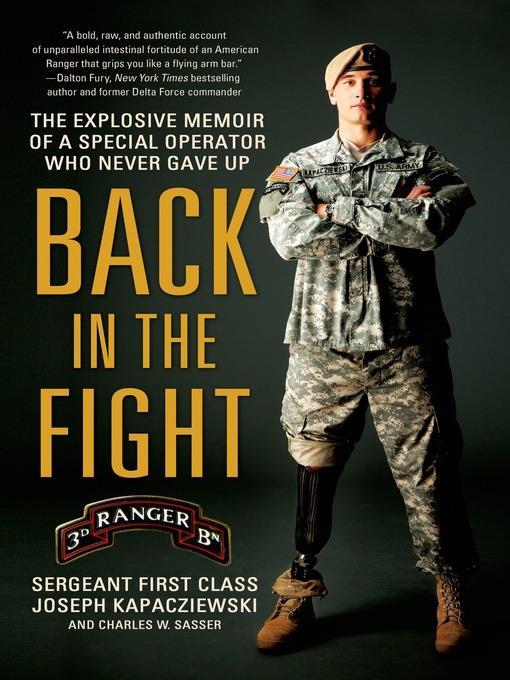
Back in the Fight
The Explosive Memoir of a Special Operator Who Never Gave Up
کتاب های مرتبط
- اطلاعات
- نقد و بررسی
- دیدگاه کاربران
نقد و بررسی

February 11, 2013
Kapacziewski and Sasser (First SEAL) add yet another macho memoir of a special ops warrior, but this one features a unique twist: an amputee Army Ranger determined to put his life and remaining limbs back on the line. During a 2005 attack in Iraq, a grenade exploded inside the armored Stryker vehicle of “Sergeant Kap,” destroying his right leg. After dozens of operations, he gave in to amputation in 2007, but refused retirement. No one took seriously his absolute conviction that he would return to his unit, but he succeeded: training, pestering his superiors, and fast-roping, running, and parachuting till they acquiesced. Since the amputation, Kapacziewski has been deployed five times, completed two New York Marathons, and three triathlons. The persistent soldier checks off the usual boxes of the genre, but military buffs will still relish this fast-paced account of youthful yearnings for military service, brutal Ranger training, and page after page of camaraderie, horseplay, grim humor, and vivid nuts-and-bolts action. Even readers lukewarm to military memoirs will admire the fierce dedication required to be the first Ranger to go to war with a prosthetic limb. 8 pages of b&w photos. Agent: Ethan Ellenberg, the Ethan Ellenberg Literary Agency.

April 1, 2013
Amped-up memoir of an elite warrior determined to fight on for his country, even after giving up a limb. The Army Rangers are renowned as the original Special Operators, whose roots, according to Kapacziewski and co-author Sasser (Sanctuary, 2013, etc.), go back to pre-Revolutionary War frontiersmen. The author joined the military in order to become a Ranger; he describes handling the Ranger Indoctrination Program, similar to the Navy SEALs' notorious "Hell Week," with aplomb. "Rangers would be deployed to combat zones almost constantly" in the years after 9/11, he writes. "This was the best time in all history to be a Ranger." Yet he bemusedly notes that "[n]othing went wrong" on his first tour of Afghanistan in 2002. Kapacziewski saw combat in repeated tours of Iraq, but he clearly enjoyed both the experience of war and the opportunity to marry an all-American girl at home, Kimberly (who provides narrative counterpoint). At first, under Special Ops' protective canopy, the author felt charmed: "No one ever seemed to get hurt on our side." He notes that modern accouterments like satellite phones, the Internet and Skype "made the war seem less dangerous." But his luck ran out in Mosul in 2005, when a grenade came through a hatch of a Stryker vehicle, resulting in severe injuries to his arm and leg. His difficult rehabilitation makes up the narrative's final third, with the twist that Kapacziewski's mulish determination led to a unique triumph: "Almost a year and a half after amputation, I was back on the line as a squad leader...the first amputee to return to full combat duty." Yet despite all his experiences, the author seems to have issues with the topics of masculinity and service: He makes clear to readers that any modern man who's not an Army Ranger is probably a "sensitive, touchy-feely" effeminate pseudo-male. A tale of impressive endurance, not enhanced by the surfeit of machismo.
COPYRIGHT(2013) Kirkus Reviews, ALL RIGHTS RESERVED.

April 15, 2013
In October 2005, Kapacziewski, a U.S. Army Ranger on duty in Iraq, sustained an injury that would have taken most soldiers out of combat forever: an enemy's hand grenade bounced through his vehicle's open hatch and exploded, nearly destroying his right leg below the knee. After dozens of surgeries, Kapacziewski kept his leg, but because he wasn't able to use it the way he wanted to, he opted to have it removed, replaced with a prosthetic, so he could return to active duty. Although he probably could have written an entire book about his injury and recovery, he chose instead to write about his career as a Ranger, taking us back to basic training and showing how his military career shaped him, turned him into the kind of man who would choose to have his own leg amputated. The injury itself occurs about two-thirds of the way through the book, which makes perfect narrative sense: we need to understand who Kapacziewski is if we're to understand the decision he made. Readers of combat memoirs should be urged to seek this one out.(Reprinted with permission of Booklist, copyright 2013, American Library Association.)

























دیدگاه کاربران